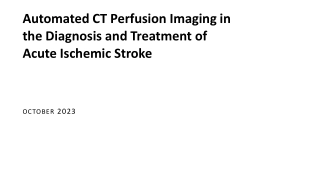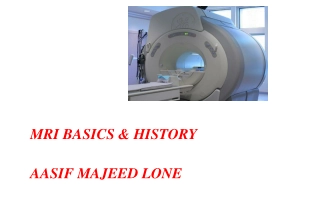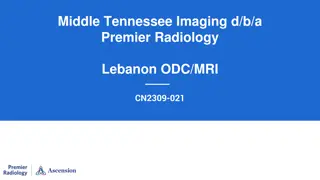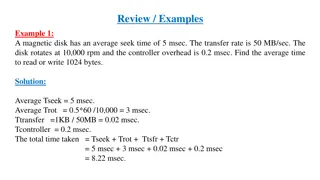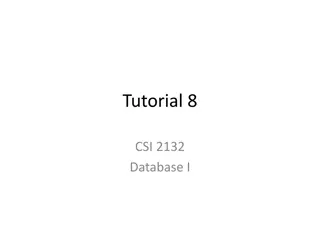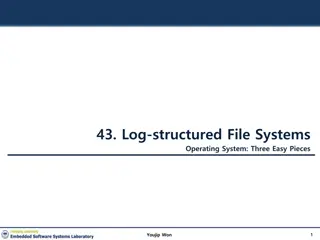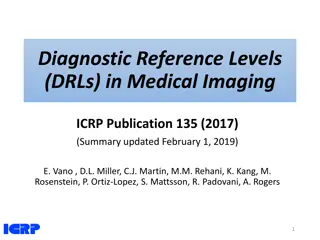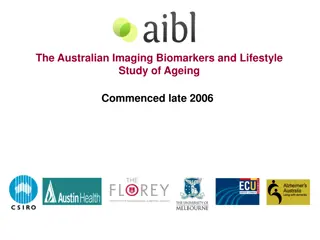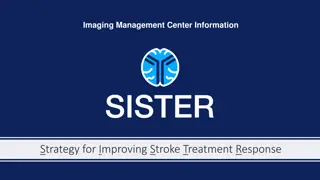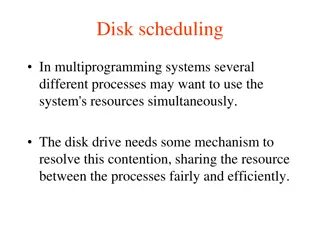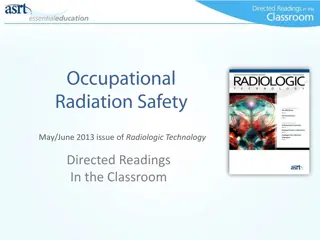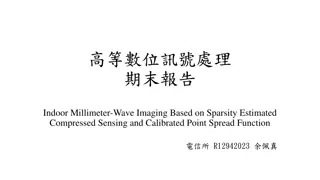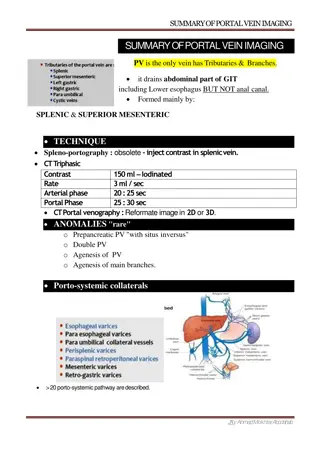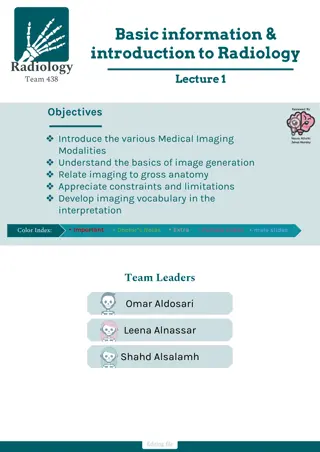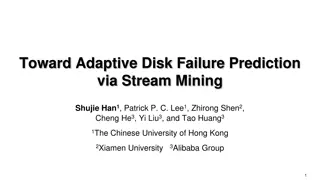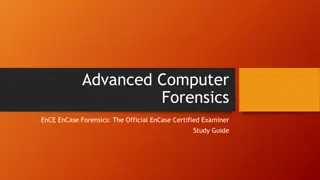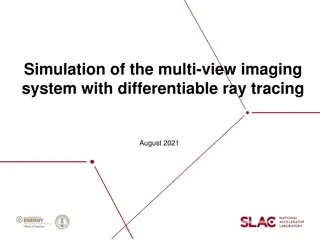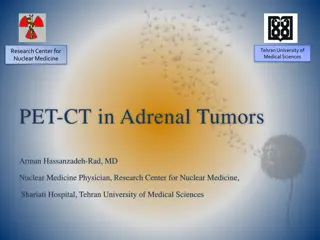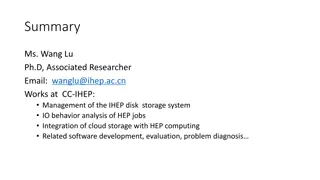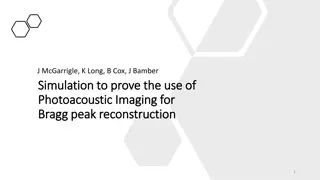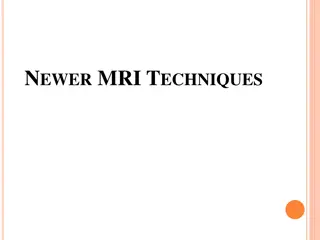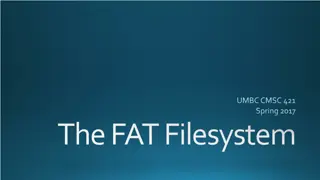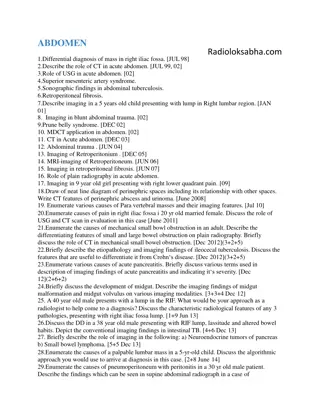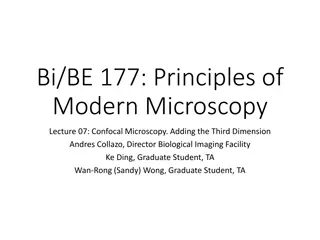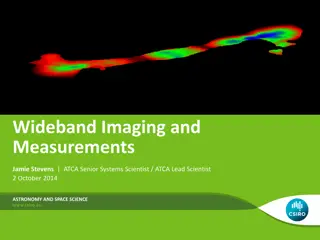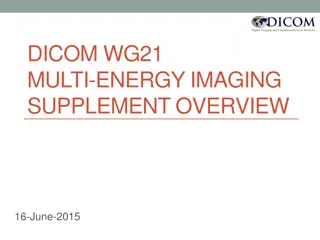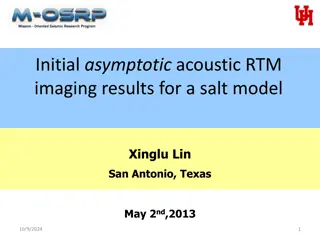mmWave SAR
The world of millimeter wave SAR, including its operating frequencies, system design, and applications such as personal security, ground imaging, automotive imaging, and 3D imaging.
6 views • 15 slides
Evolution of Digital Radiography in Medical Imaging
Explore the evolution of digital radiography in medical imaging, from the invention of CMOS in 1963 to the development of Gadolinium-based flat-panel detectors in 1997. Learn about the advantages and challenges of digital imaging technology and its impact on the field of radiography.
0 views • 102 slides
Automated CT Perfusion Imaging in Acute Ischemic Stroke: Overview
This presentation delves into the significance of automated CT perfusion imaging in diagnosing and treating acute ischemic stroke. It covers essential information such as the burden of stroke in Ontario, the critical aspect of time in stroke treatment, hyperacute stroke treatment goals, and the impo
4 views • 41 slides
MRI BASICS & HISTORY AASIF MAJEED LONE
Magnetic Resonance Imaging (MRI) has revolutionized medical imaging, offering detailed views of the body without harmful radiation. This article delves into the historical development of MRI, highlighting key milestones such as the discoveries of the Rotating Magnetic Field by Nikola Tesla and the w
9 views • 49 slides
Chest Imaging Interpretation for Tuberculosis Screening
Chest imaging plays a crucial role in screening for pulmonary tuberculosis (TB). This activity, led by Dana Kissner from Wayne State University Detroit Tuberculosis Clinic, focuses on interpreting chest imaging results to aid in the diagnosis and management of TB cases. The content includes informat
3 views • 22 slides
Premier Radiology: Quality Imaging Provider in Middle Tennessee
Premier Radiology, operating in Middle Tennessee under various names, offers a range of imaging services including X-Ray, CT, Mammography, and Ultrasound. The company does not plan to add MRI services to its Lebanon location but will acquire an existing unit. Detailed projections, utilization data,
0 views • 24 slides
Understanding Diffusion Weighted Imaging (DWI) in Neuroimaging Research
This content delves into the significance of Diffusion Weighted Imaging (DWI) in studying the motion of water molecules in brain tissue. It explains how water diffusion varies in different brain matter types and explores techniques like Diffusion Tensor Imaging (DTI). The impact factors on diffusion
4 views • 25 slides
Basic Principles of MRI Imaging
MRI, or Magnetic Resonance Imaging, is a high-tech diagnostic imaging tool that uses magnetic fields, specific radio frequencies, and computer systems to produce cross-sectional images of the body. The components of an MRI system include the main magnet, gradient coils, radiofrequency coils, and the
2 views • 49 slides
Radiographic Imaging Methods of the Respiratory System
Radiographic imaging plays a crucial role in the evaluation and diagnosis of thoraco-mediastino-pleuro-pulmonary conditions. Techniques like radioscopy, digital radiography, computer tomography, magnetic resonance imaging, conventional pulmonary angiography, and hybrid imaging methods offer detailed
10 views • 21 slides
SALIVARY GLAND IMAGING
Salivary gland imaging plays a crucial role in diagnosing and monitoring diseases of the major salivary glands, including the parotid, submandibular, and sublingual glands. Different imaging techniques such as computed tomography, MRI, and ultrasound are used to visualize these glands and aid in dif
1 views • 12 slides
Disk Performance Considerations and Calculations
Explore examples of disk performance calculations, including seek time, transfer rate, rotational speed, controller overhead, capacity calculations for platters and cylinders, and total disk capacity. Understand how to calculate average time for reading or writing data, number of platters required f
5 views • 5 slides
Understanding Disk Storage Systems in Computer Science
Disk storage systems play a crucial role in computer architecture. This tutorial delves into the differences between disks and main memory in terms of access time, capacity calculations, block sizes, rotational delays, and transfer rates. It covers key concepts such as track capacity, surface capaci
0 views • 23 slides
Operating System: File Allocation Methods
File allocation methods in operating systems determine how files are stored in disk blocks. The main methods include Contiguous Allocation, Linked Allocation, and Indexed Allocation. Contiguous Allocation involves allocating blocks in a contiguous manner for efficient disk space utilization and fast
0 views • 14 slides
Understanding Log-structured File Systems in Operating Systems
Log-structured file systems (LFS) address performance issues by transforming updates into sequential writes to disk. This process improves efficiency by buffering updates in memory before writing them to disk. The strategy includes determining buffer size to optimize write effectiveness and utilizin
0 views • 17 slides
Diagnostic Reference Levels in Medical Imaging and Radiation Protection
The concept of Diagnostic Reference Levels (DRLs) is crucial in evaluating the amount of ionizing radiation used in medical imaging procedures. DRLs help determine if radiation levels are appropriate and need optimization. Authorized bodies establish numerical DRL values as advisory guidelines. Loca
1 views • 26 slides
Australian Imaging Biomarkers and Lifestyle Study: Progress and Focus
The Australian Imaging Biomarkers and Lifestyle Study of Ageing (AIBL) commenced in late 2006, with a cohort size and follow-up progress detailed. The study includes assessments and biomarker imaging, such as MRI, amyloid PET, and tau PET scans, with ongoing review cycles and data additions. Current
0 views • 12 slides
Understanding Optical Storage Technology
Optical storage technology originally designed for audio offers a capacity of 650MB, providing over 70 minutes of audio playback. Data is recorded digitally on a polycarbonate disk's surface as microscopic pits. The disk is organized in a spiral track with sectors of the same length arranged in bloc
5 views • 16 slides
Enhancing Stroke Treatment Response Through Advanced Imaging Management Center Strategy
This information details the strategy proposed by the Imaging Management Center to improve stroke treatment response. It emphasizes the importance of timely uploading of brain imaging data within specified timeframes using the AMBRA platform. The process involves modalities like NCCT, CTA, MRI, and
0 views • 6 slides
Understanding Disk Scheduling in Multiprogramming Systems
In a multiprogramming system, several processes may contend for disk resources. Disk scheduling aims to efficiently share the disk drive's resources among processes, maximizing I/O request satisfaction while minimizing head movement. Various disk scheduling policies like FCFS, SSTF, and SCAN aim to
1 views • 22 slides
Understanding Ionizing Radiation in Medical Imaging
Radiation in medical imaging plays a critical role in diagnosis and treatment but also poses risks to patients and healthcare workers. Ionizing radiation, used in various imaging modalities, can cause harm to healthy cells if not managed properly. This article discusses the implications of radiation
0 views • 54 slides
Sparse Millimeter-Wave Imaging Using Compressed Sensing and Point Spread Function Calibration
A novel indoor millimeter-wave imaging system based on sparsity estimated compressed sensing and calibrated point spread function is introduced. The system utilizes a unique calibration procedure to process the point spread function acquired from measuring a suspended point scatterer. By estimating
2 views • 26 slides
Portal Vein Imaging Techniques and Anomalies Overview
Portal vein imaging is crucial for evaluating conditions affecting the abdominal part of the gastrointestinal tract. Techniques such as spleno-portography and CT triphasic contrast imaging are used to visualize the portal vein and diagnose anomalies like portal-systemic collaterals and porto-systemi
4 views • 7 slides
Introduction to Radiology: Imaging Modalities and Techniques
Radiology is a medical specialty that utilizes various imaging modalities such as X-Ray, MRI, CT, and Ultrasound to diagnose and treat patients. This field involves the supervision, performance, and interpretation of imaging studies, with findings reported to referring physicians. Radiology also inv
0 views • 10 slides
StreamDFP: Adaptive Disk Failure Prediction via Stream Mining
StreamDFP introduces a general stream mining framework for disk failure prediction, addressing challenges in modern data centers. By predicting imminent disk failures using machine learning on SMART disk logs, it aims to enhance fault tolerance and reliability. The framework adapts to concept drift
0 views • 26 slides
Disk and I/O Tuning on Microsoft SQL Server by Kevin Kline
Explore disk and I/O tuning best practices for Microsoft SQL Server with insights from Kevin Kline, covering fundamentals of disk hardware architecture, disk sector alignment issues, performance impacts, and the emergence of SSD technology. Discover key strategies and resources for optimizing disk a
0 views • 34 slides
Understanding File Systems and Disk Basics in Computer Forensics
Explore the fundamentals of file systems and disk basics in computer forensics, covering topics such as disk preparation, partitioning, volume creation, file system formatting, FAT basics, and file allocation tables. Learn about disk structures, cluster allocation, and the functioning of FAT version
0 views • 24 slides
Advanced Microscopy Techniques in EUV Lithography: SHARP Overview
SHARP utilizes Fresnel zone plate lenses to achieve diffraction-limited quality in EUV lithography, offering a range of NA values and image magnifications. The system allows emulation of mask-side imaging conditions with hundreds of lenses available. Coherence control and engineering are provided th
1 views • 18 slides
Insights into Multi-View Imaging System Optimization
Delve into the simulation and calibration of a multi-view imaging system using differentiable ray tracing and gradient-based optimization. Explore the challenges of ambiguity in results and the impact of angular offset on imaging accuracy. Discover how the system handles errors and maintains precise
0 views • 6 slides
Understanding PET-CT Imaging in Adrenal Tumors at Tehran University
Tehran University of Medical Sciences' Research Center for Nuclear Medicine specializes in PET-CT imaging for adrenal tumors. Dr. Arman Hassanzadeh-Rad, MD, explains the principles of PET imaging, hybrid imaging combining PET and CT, F-18 FDG use, SUV measurement, and more. PET-CT allows for both at
0 views • 21 slides
Research Insights on IHEP Disk Storage Systems and Cloud Computing Integration
Ms. Wang Lu, Ph.D., an associated researcher at CC-IHEP, specializes in the management and analysis of the IHEP disk storage system, IO behavior analysis of HEP jobs, and the integration of cloud storage with HEP computing. Her research involves software development, evaluation, and problem diagnosi
0 views • 9 slides
Simulation Study of Photoacoustic Imaging for Bragg Peak Reconstruction
This study explores the use of simulation in Photoacoustic Imaging for reconstructing the Bragg peak in proton therapy. It discusses the concept of Photoacoustic Imaging, the generation of acoustic waves from pulsed electromagnetic radiation, and the experimental setups for characterizing proton dos
0 views • 13 slides
Overview of Radiography and Ultrasound Imaging Techniques
This content provides a comprehensive overview of conventional radiography, digital radiography, and ultrasound imaging techniques. It covers equipment details, safety issues, advantages vs. limitations, as well as the interpretation, magnification, and integration capabilities of these imaging moda
0 views • 28 slides
Understanding Magnetic Resonance Imaging (MRI)
Magnetic Resonance Imaging (MRI) is an imaging technique based on nuclear magnetic resonance principles. It was first developed in the 1970s by Paul Lauterbur and Peter Mansfield. MRI uses the interaction between protons in the body and magnetic fields to create detailed images. This technology has
0 views • 77 slides
Overview of FAT Filesystem: Definitions, History, and Structures
The FAT (File Allocation Table) Filesystem dates back to the late 1970s and has evolved through versions like FAT8, FAT12, FAT16. This system organizes data on disk using a simple yet effective structure of allocation tables for file storage, following Little Endian byte ordering. The FAT structure
0 views • 14 slides
Comprehensive Radiological Imaging Review in Abdominal and Adrenal Pathologies
This extensive radiological imaging review covers a wide range of topics in abdominal and adrenal pathologies, discussing differential diagnoses, imaging modalities such as CT and USG, specific syndromes like prune belly syndrome, and conditions like retroperitoneal fibrosis. It delves into various
0 views • 39 slides
Exploring Confocal Microscopy: Adding the Third Dimension
Delve into the world of confocal microscopy with Lecture 07 of Principles of Modern Microscopy. Learn about optical sectioning, wide-field imaging, confocal laser scanning, and more to enhance fluorescence in microscopy. Understand the methods of optical sectioning such as deconvolution, multi-photo
0 views • 65 slides
Wideband Imaging and Measurements in Astronomy
Wideband imaging and measurements play a crucial role in astronomy and space science. This involves utilizing wide bandwidths to make accurate measurements and create images for continuum mapping and spectral-line observations. Increasing bandwidth enables lower thermal noise levels, quicker identif
0 views • 32 slides
Overview of DICOM WG21 Multi-Energy Imaging Supplement
The DICOM WG21 Multi-Energy Imaging Supplement aims to address the challenges and opportunities in multi-energy imaging technologies, providing a comprehensive overview of imaging techniques, use cases, objectives, and potential clinical applications. The supplement discusses the definition of multi
0 views • 33 slides
Understanding Initial Asymptotic Acoustic RTM Imaging Results in Salt Model
Acquire insights into the initial asymptotic acoustic RTM imaging results for a salt model in Xinglu Lin, San Antonio. This study delves into the concept of Reverse Time Migration (RTM), showcasing the methodology, workflow, and imaging conditions involved in this innovative seismic imaging techniqu
0 views • 22 slides
Exploring the UK Linguistics Olympiad (UKLO) and the Rosetta Disk
Delve into the world of the UK Linguistics Olympiad (UKLO) and the intriguing Rosetta Disk. Discover the incredible achievements, medal winners, intriguing insights into numerous languages, and the Rosetta Disk's extensive documentation on human languages worldwide.
0 views • 8 slides


